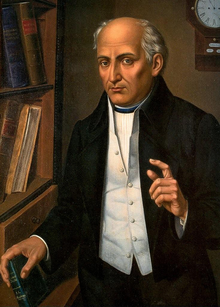Miguel Hidalgo y Costilla
| Miguel Hidalgo | |
|---|---|

Generalísimo of the Mexican Army
|
|
| Born | 8 May 1753 Pénjamo, Guanajuato, Viceroyalty of New Spain (present-day Guanajuato, Mexico) |
| Died | 30 July 1811 (aged 58) Chihuahua, Chihuahua, Viceroyalty of New Spain (present-day Mexico) |
| Buried at | El Ángel de la Independencia Mexico City |
| Allegiance | Mexico |
| Service/branch | Revolutionary Army |
| Years of service | 1809–1811 |
| Commands held | Mexican Revolutionary |
| Battles/wars | Mexican War of Independence |
Don Miguel Gregorio Antonio Ignacio Hidalgo-Costilla y Gallaga Mandarte Villaseñor (8 May 1753 – 30 July 1811), more commonly known as Don Miguel Hidalgo y Costilla or simply Miguel Hidalgo, was a Mexican Roman Catholic priest and a leader of the Mexican War of Independence.
He was a professor at the Colegio de San Nicolás Obispo in Valladolid and was ousted in 1792. He served in a church in Colima and then in Dolores, Guanajuato. After his arrival, he was shocked by the poverty he found. He tried to help the poor by showing them how to grow olives and grapes, but in Mexico, growing these crops was discouraged or prohibited by the authorities due to Spanish imports of the items. In 1810 he gave the famous speech, "The Cry of Dolores", calling upon the people to protect the interest of their King Fernando VII (held captive by Napoleon) by revolting against the European-born Spaniards who had overthrown the Spanish Viceroy.
He marched across Mexico and gathered an army of nearly 90,000 poor farmers and Mexican civilians who attacked and killed both Spanish Peninsulares and Criollo elites, even though Hidalgo's troops lacked training and were poorly armed. These troops ran into an army of 6,000 well-trained and armed Spanish troops; most fled or were killed at the Battle of Calderón Bridge
Hidalgo was the second-born child of Don Cristóbal Hidalgo y Costilla and Doña Ana María Gallaga. Hidalgo was born a criollo. Under the system of the day, Hidalgo's rights as a criollo were far less than those of someone born in Spain but better than a mestizo, a person of both Spanish and Amerindian ancestry, and other castas. Both of Hidalgo's parents were descended from well-respected families within the criollo community. Hidalgo's father was an hacienda manager, which presented Hidalgo with the opportunity to learn at a young age to speak the indigenous languages of the laborers. Eight days after his birth, Hidalgo was baptized into the Roman Catholic faith in the parish church of Cuitzeo de los Naranjos. Hidalgo's parents would have three other sons; José Joaquín, Manuel Mariano, and José María.
...
Wikipedia
